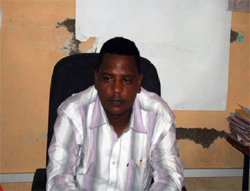Educating the Community for Successful Malaria Interventions
 |
|
| "Now that I have learned the use of bed nets, my children and I started to use our net correctly and consistently," Mrs. Rawuda said. Source: PMI |
|
Mrs. Rawuda is the mother of three children who lives in Sokoru District, Oromia Regional State, Ethiopia. She is one of nearly 95,600 people who have been trained and have participated in community conversations on malaria prevention and control, organized by Fayyaa Integrated Development Association (FIDA), a nongovernmental organization working in Ethiopia and supported by PMI through the Malaria Communities Program. "Even though I had a bed net at home, I and my children were not using it because I did not believe that sleeping under the net would protect us from being infected by malaria. Now that I have learned about the use of nets, my children and I started to use it correctly and consistently."
Since 2005 more than 20 million insecticide-treated nets have been distributed free of charge to prevent and control malaria in Ethiopia. However, the initiative was compromised by low net use; about a third of households that own nets do not use them. In order to tackle this problem, with support from PMI, FIDA is conducting community-level education activities focusing on the use of nets and early diagnosis and treatment of malaria. Training is also provided for religious and community leaders in order to mobilize the community to implement malaria prevention and control efforts.
 |
|
| "Intensive community education paved the way for successful IRS coverage in our district," said Mr. Gezu, Adea District Health Officer. Source: PMI |
|
FIDA also worked in Adea District to increase acceptance of indoor residual spraying (IRS) by the community. Mr. Gezu, Adea District Health Officer noted, “In our district, Adea, it has been difficult to mobilize the community for malaria prevention and control intervention activities. Getting consent of the community to spray insecticide inside their houses has been very difficult. But this year, the intensive community education paved the way for successful IRS implementation, which in turn resulted in increased IRS coverage in our district as compared to the previous two years. We are very much grateful for FIDA’s and PMI’s support.”